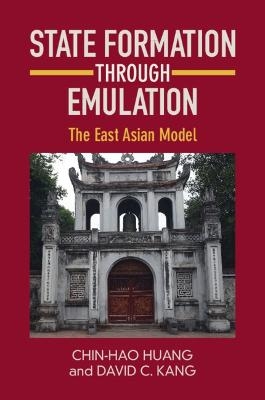
State Formation through Emulation
Cambridge University Press (Verlag)
978-1-009-09631-7 (ISBN)
Neither war nor preparations for war were the cause or effect of state formation in East Asia. Instead, emulation of China—the hegemon with a civilizational influence—drove the rapid formation of centralized, bureaucratically administered, territorial governments in Korea, Japan, and Vietnam. Furthermore, these countries engaged in state-building not to engage in conflict or to suppress revolt. In fact, war was relatively rare and there was no balance of power system with regular existential threats—the longevity of the East Asian dynasties is evidence of both the peacefulness of their neighborhood and their internal stability. We challenge the assumption that the European experience with war and state-making was universal. More importantly, we broaden the scope of state formation in East Asia beyond the study of China itself and show how countries in the region interacted and learned from each other and China to develop strong capacities and stable borders.
Chin-Hao Huang is assistant professor of political science and head of studies for global affairs at Yale-NUS College in Singapore. His research and teaching focus on China's foreign relations, the international relations of East Asia, and international security. His books include Power, Restraint, and China's Rise (2022) and Identity in the Shadow of a Giant: How the Rise of China is Changing Taiwan (2021). David Kang is Maria Crutcher Professor of International Relations at the University of Southern California, where he is also director of the USC Korean Studies Institute. He researches East Asian security, the international relations of historical East Asia, and Korean politics.
1. Introduction: The East Asian Model of State Formation; 2. Theories of State Formation and Diffusion; 3. Phase 1 and Onwards: Hegemony, Bureaucracy, and Confucianism; 4. The Absence of Bellicist Pressures in State Formation, 400 – 800 CE; 5. Phase II: State Formation in Korea and Japan, 400 – 800 CE; 6. Korea and Japan over the Centuries; 7. Vietnam emerges, 10th – 14th Centuries; 8. Epistemic Communities and Regional Connections; 9. Who Doesn't Emulate? The Borderlands of the Central Asian Steppe; 10. Conclusion: East Asian Developmental States in the 20th Century. Appendix; References; Index.
| Erscheinungsdatum | 25.07.2022 |
|---|---|
| Zusatzinfo | Worked examples or Exercises |
| Verlagsort | Cambridge |
| Sprache | englisch |
| Maße | 152 x 228 mm |
| Gewicht | 380 g |
| Themenwelt | Geisteswissenschaften ► Geschichte ► Regional- / Ländergeschichte |
| Sozialwissenschaften ► Politik / Verwaltung ► Europäische / Internationale Politik | |
| Sozialwissenschaften ► Soziologie | |
| ISBN-10 | 1-009-09631-1 / 1009096311 |
| ISBN-13 | 978-1-009-09631-7 / 9781009096317 |
| Zustand | Neuware |
| Haben Sie eine Frage zum Produkt? |
aus dem Bereich


